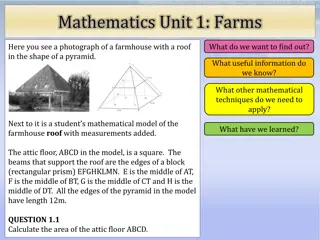Massachusetts Pyramid Model - State of the State 2017 Summit
The Massachusetts Pyramid Model focuses on early childhood education and care, with initiatives like the annual summit, phases of work rollout, targeted training programs, and building state infrastructure. It involves diverse stakeholders, from educators to mental health consultants, in implementing effective strategies for children's development. The model emphasizes data collection, training, and community collaboration to enhance family support and create a robust early intervention system. Learn about the innovative approaches and outcomes of the Massachusetts Pyramid Model in this comprehensive overview.
Download Presentation

Please find below an Image/Link to download the presentation.
The content on the website is provided AS IS for your information and personal use only. It may not be sold, licensed, or shared on other websites without obtaining consent from the author.If you encounter any issues during the download, it is possible that the publisher has removed the file from their server.
You are allowed to download the files provided on this website for personal or commercial use, subject to the condition that they are used lawfully. All files are the property of their respective owners.
The content on the website is provided AS IS for your information and personal use only. It may not be sold, licensed, or shared on other websites without obtaining consent from the author.
E N D
Presentation Transcript
Massachusetts Pyramid Model 5th Annual Summit: State of the State 2017
Phases of Mass. Pyramid work CSEFEL Pyramid State Roll out (2009-2013) Trained trainer and coaches, 3 ECE demo sites, program wide training, data collection, family modules training Making the Pyramid our Own Blended B-5 approach, created Foundations of the Pyramid and Top of the Pyramid Skills, adapted coach training and train trainer, convened annual Summit Spreading and Scaling Master Cadre, ECE implementation sites, ECE program wide sites, homeless shelter project, higher ed institutes Bridging Across Systems Dept. Elementary and Secondary Ed. (ESE) State Systemic Improvement Plan (SSIP), Early Intervention SSIP; Pyramid Model Learning Communities; Inclusive Pyramid Demonstration sites
Massachusetts Pyramid Model Training with Target Audiences Early Education & Care, Public Preschool Special Education, Early Intervention Practitioners Infant/Toddler and Preschool Modules Foundations of the Pyramid Model Mental Health Consultant, Early Education Administrator & Teacher Teams Early Intervention, Mental Health Consultants, Family Support, Home Visiting, Primary Care Behavioral Health Integration Teams Top of the Pyramid Skills (TOPS) Parents Interacting with Infants (PIWI) Positive Solutions: Family Modules Shelter staff: Administrators, Floor Staff & Mental Health Clinicians Positive Solutions for Powerful Family Interactions ECE Program Teams implementing to fidelity Mental Health Clinicians & Administrators Adopting the Pyramid Model Program-Wide Pyramid Coach's Training Teaching staff at 2 & 4 year institutions Pyramid Higher Ed Institute
Overview - Building State Infrastructure Coordinate interagency efforts to support families Data collection and longitudinal data systems Pyramid State Leadership Team coordination Coordinated grant programs Using Build Building State Infrastructure Implementation Science - depth over breadth community implementation Adapted from Massachusetts Department of Elementary and Secondary Education 4
Our New Mass Pyramid Website!! http://connectedbeginnings.org/mapyramidmodel/
http://connectedbeginnings.org/mapyra midmodel/resources/
Pyramid Model Learning Communities Our 4th round of PMLCs will be in May in Springfield, Boston, Lawrence, Worcester and Taunton Facilitated by a set of trained Pyramid external coaches PMLCs helped identify training needs for 3 initial regions: Boston/Metro Program Wide (completed last fall), Worcester Positive Solutions and Springfield Foundations, both planned for this summer Needs identified: funding, training, getting everyone to the table/collective impact, staff retention & skill level Behaviors/trends observed: parental red flags/lack of engagement; child neglect/basic needs; child aggression, distractibility, low tolerance for frustration; child and parent trauma
Inclusive Demonstration sites 3 sites will be selected to receive training and coaching on the Pyramid Model to support inclusion of children with disabilities. 8 sites were recommended by Pyramid coaches and trainers based on their commitment, leadership, and readiness to embark on this journey. Initial focus will be 1 classroom receiving coaching support. On-site coaching will include: observation of current practices, help to develop an action plan, training in the Pyramid, and coaching to support implementation of teaching practices with enough intensity and focus to make a change. Site Leadership Team will examine policies and practices so that efforts are streamlined, supported, and sustained.
Department of Elementary and Secondary Education (ESE) ESE is working intensively with 19 public school districts representing almost 30% of the state public preschool population to support program wide implementation of the Pyramid Model. Training for district leadership teams, coaches, and teachers supports depth and spread of implementation in these districts and their community partners. ESE is also supporting the use of Positive Solutions in these districts and their community partners. ESE is funding an Interagency Agreement with DPH to support the Summit, PMLCs, State Leadership Team, and the Inclusion Demo sites.
Department of Early Education and Care (EEC) EEC and ESE are hosting a two-part series on Positive Solutions for Families . It will highlight content from each of the 6 modules and resources to support educators working with families. Community teams will develop plans and learn strategies on how to engage families using these modules to support families, communities and school connections. Tweety Yates is the presenter. EEC is conducting communities of practice meetings on the preschool modules for the mixed delivery system in MA. EEC s Educator and Provider Support grantees (EPS) professional development opportunities include CEU- bearing Pyramid Model trainings for community and public early care and education programs.
Department of Public Health (DPH) DPH manages the ESE Interagency Agreement activities DPH s Massachusetts Early Intervention (EI) system has a a state-wide initiative to embed principles from the Parents Interacting with Infants (PIWI) approach to working with families during home visits.This is one strategy of the State Systemic Improvement Plan (SSIP) to address Social Emotional skills in children enrolled in EI. EI has a cadre of trainers, a Pyramid Foundations online module for all EI providers, and training for all EI providers statewide on the PIWI philosophy and following up coaching at all programs. Project LAUNCH Expansion grant funds supported piloting of the Pyramid Model Learning Community in three regions of the state, and funded start-up of the MA Pyramid Model website
Head Start and Early Head Start UMass Donahue Institute s Regional Head Start TTA Network worked with 3 Head Start grantees in their implementation of the Pyramid Model approach in their infant-toddler programs. They also sponsored two cohorts at Institutes on Systems for Social Emotional Wellness, which gave teams an opportunity to use the Pyramid Model as a framework for revising program systems, policies and practices to improve their support of social emotional wellness for children, families and staff. Worcester Community Action Council (WCAC) participated in Program Wide Roll-out training and PIWI for their EHS groups and home visiting. Haverhill Community Action, Inc. (CAI) is exploring the Pyramid adoption for HS & EHS.
Connected Beginnings CBTI has trained thousands of early childhood professionals in a variety of roles on all levels of the Pyramid Model. Since April 2016, CBTI has trained over 500 early childhood professionals. CBTI continues to offer training and TA to support the Pyramid Model efforts in Connecticut, primarily with the Solid Ground Project. CBTI has led the development, launch, and maintenance of the new Massachusetts Pyramid Model website. The website will provide the Commonwealth with a much-needed hub of information on all the exciting things going on with the Pyramid Model across the state. CBTI also assisted in the creation and delivery of 11 Pyramid Model Community of Practice (PMLC) meetings in 5 different regions of Massachusetts. The PMLCs provide opportunities for communities to coordinate their efforts related to the Pyramid Model, build capacity, and learn about resources.























